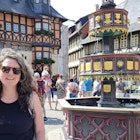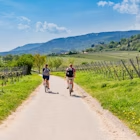

Inside and out, Stuttgart's serene public library has views worth writing home about © Kat Barber / Lonely Planet
Stuttgart is Germany's sixth-biggest city, and its richest, thanks to a formidable car industry. As the birthplace of both Mercedes-Benz and Porsche, Stuttgart has state-of-the-art museums dedicated to both, which attract rev-heads from all over the world. But once you’ve overdosed on cars, there’s plenty more to keep you busy in the capital of Baden-Wurttemberg. In honour of the locals' most renowned characteristic – thriftiness – here are 10 of the best free things to do in Stuttgart.

Stadtbibliothek
The prisonlike exterior sets low expectations, but take a swift elevator ride up to the seventh floor of the public library: the view that greets you is something else. Designed by Korean architect Eun Young Yi in 2011, the space is serene, organised and anything but traditional, and the ceiling of skylights produces a brightness not usually found in libraries. Grab a drink in the top-floor cafe, then head up to the rooftop for impressive views over the city.
Markthalle
Set in a 100-year-old art nouveau building in the city centre, the Stuttgarter Markthalle has to be one of the most beautiful in Germany. Wander past over 30 stalls, tasting samples of local chocolates, cheeses, hams and breads. Don’t miss the aromatic florist at the front entrance, as well as the view from the second floor, where you can also find some of Stuttgart’s most jaw-dropping homewares. Open daily except Sundays.

Paternoster in the Town Hall
A ride in a vintage elevator may not have been on your bucket list, but trust us on this one! In the Rathaus (Town Hall) you’ll find a doorless Paternoster elevator, one of only a few still operating around the world. It runs continuously, so you simply need to jump in one of the cabins as soon as you feel brave. There's no waiting, no buttons and certainly no doors. You can visit weekdays between 8am and 5pm.
Grabkapelle Rotenberg
Stretch your legs with a meander through vineyards (or catch the No 61 bus) on your way up to Stuttgart’s most romantic spot, the Grabkapelle Rotenburg (Sepulchral Chapel). It was built by King Wilhelm I in 1820 in memory of his beloved wife, and the view from the neoclassical chapel over vineyards and villages is simply stunning.

Stuttgarter Stäffele
One of the surprising things you notice about Stuttgart is just how many vineyards cover the slopes around the inner city. While many of these vines have been replaced by apartments, the hidden Stäffele – stairways that winegrowers have used since the 19th century to scurry between the vines – remain. Over 400 hidden stairways are dotted around the city that will transport you very quickly, albeit slightly out of breath, up to incredible views. A favourite is the Willy Reichert Staffel that takes you up to Karlshöhe park and a well-earned drink in the summer beer garden.
Free walking tour
As with most European cities, one of the best free things to do is a walking tour. Over two hours, your guide will recount a beginner's guide to Stuttgart as you explore some architecture in the downtown area, both beautiful and hideously ugly. Most importantly, you’ll learn about the best places to try the local dishes Käsespätzle (cheese noodles) and Maultaschen (stuffed pasta pouches). Tips are welcome, but not compulsory.

Max-Eyth-See wine walk
A busy place in summer with picnics, bikes and pedal boats, Max-Eyth-See is a big city lake with a backdrop of sloping vineyards. The best way to explore is by following the Weinwanderweg (walking trail) that loops up through the vineyards, and back around in front of the lake. The total loop takes about three hours.
Bärenschlössle
Bärenschlössle (Bear Castle) is a popular park and lake area close enough to the city that you can escape for an afternoon stroll. While there aren’t actually any bears here, a loop through the park will take you past the real residents: deer and hogs. Stop for a rest at the prince’s old hunting lodge for a bite to eat – the Flammkuchen (Alsatian 'pizza') is delicious – and enjoy views over the lake.

Weihnachtsmarkt
Stuttgart’s Christmas market unravels through the main square and wraps itself around every corner of the city. Over 300 stalls, each stunningly decorated, offer Christmas trinkets, snacks and enough Glühwein (mulled wine) to warm your bones. Don’t miss the incredible miniature village complete with ride-on train and quaint Fachwerk (timber frame) houses in Schlossplatz. Weihnachtsmarkt runs from late November until 23 December.
Staatsgalerie
Feeling artsy? Head to the Staatsgalerie on Wednesdays for free entry to see the collection of 800 works by artists ranging from old Dutch masters to Banksy. Banksy’s infamous shredded artwork Love is in the Bin is on display here until March 2020.
Explore related stories



 Budget TravelHow I traveled using Germany’s €9 travel pass: my 48-hour itinerary
Budget TravelHow I traveled using Germany’s €9 travel pass: my 48-hour itineraryAug 2, 2022 • 7 min read

 Air TravelThese are the European airports rated best for cheap international deals
Air TravelThese are the European airports rated best for cheap international dealsAug 6, 2019 • 2 min read





